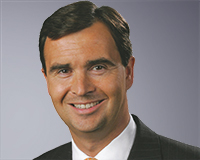 JLL president Christian Ulbrich is set to replace retiring chief executive Colin Dyer at the start of October.
JLL president Christian Ulbrich is set to replace retiring chief executive Colin Dyer at the start of October.
Ulbrich, the former chief executive of JLL’s EMEA business, will continue as president and take on the new role at a time when the company is posting strong growth as well as greater competition.
Earlier this month, JLL reported record revenue of $1.6bn (£1.2bn) in its second- quarter results, up by 16.7% from Q2 2015.
But JLL was beaten to the top spot on Real Capital Analytics’ ranking of global property advisers last year by CBRE, despite holding its place at the top of Asia Pacific for the fifth time.
During his tenure as head of EMEA, Ulbrich tripled revenue in Europe and oversaw the takeover of companies such as King Sturge in 2011. JLL’s EMEA operating income fell by 60% year-on-year, to $20m in Q2.
Competition among the largest real estate advisory firms has risen after DTZ’s $2bn acquisition of Cushman & Wakefield a year ago.
Colin Dyer, who had been chief executive of JLL since 2004, oversaw the company’s growth into 30 new countries around the world and drove revenue to $6bn a year.
Dyer will remain on the board of directors until the annual shareholders’ meeting in spring 2017.
CV: Christian Ulbrich
President and chief executive, JLL: October 2016
President, JLL: June 2016 onward
Chief executive, EMEA, JLL: 2009-16
Managing director, JLL Germany: 2005-09
Member, Germany property federation executive committee: 2009 onward
Education: University of Hamburg, Stanford University Graduate School of Business
Q&A: Christian Ulbrich
What were the most important things you learnt under outgoing chief executive Colin Dyer?
Colin was a mastermind in turning our diversity into something good for our clients and our organisation. That is something in which I have developed my skills over the past ten years, as I observed how he was doing it and tried to emulate his skills. We are leading our industry, in terms of technology. This performance didn’t come about by itself, because we operate in real estate, which is a very traditional environment. We were steered into that direction by Colin.
Is Dyer’s legacy a daunting one to follow?
That’s not how we think. A number of people could have stepped up into his position. I’m now honoured to be the one who was chosen, but I don’t see it as a daunting legacy at all. I find it inspiring that he was leading our organisation. He will continue to be a mentor to me for many more years.
What are your concerns right now about the market globally?
There are a lot of issues that might have an impact on the real estate market. On the other hand, I’ve been running the EMEA region since 2009, and during that time, we’ve had a financial crisis, the euro crisis, the Ukrainian invasion and the Brexit result. A successful company needs to adapt and deal with all situations.
What are the opportunities at the moment?
When times become challenging and visibility decreases, our corporate clients are even more focused on driving efficiency in their real estate portfolio. That is a massive opportunity, especially in Europe, because most corporate clients are still in the early stages of the cycle with regard to real estate outsourcing.










